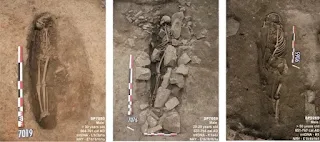The discovery of three graves in southern France in early 2016, whose owners were buried on their right sides and their heads facing Mecca, is one of the most important excavations that confirm the very early arrival of Muslims in France.
Experts describe the discovery as unexpected, noting that these three graves, which were found in the city of Nîmes in the Gard region in southern France, are the first evidence indicating the presence of Islamic communities in southern France since the beginning of the Middle Ages.
These three graves, discovered by chance during excavation of foundations for an underground car park, are now the oldest ever found in this country.
Some experts date these graves back to the seventh century AD, others to the eighth century AD, and some say that they date back to the era of the Rightly Guided Caliphs and the Umayyad state.
The three graves belong to men buried according to Islamic law, unlike other nearby graves found in the area. Inside the three unique graves, skeletons were found lying on their right sides, with their heads facing southeast towards Mecca.
Experts also found evidence that the three skeletons had been engaged in muscular work for many years.
Another interesting detail is that radiocarbon analysis showed that the human remains found on the outskirts of the French city of Nîmes date back to the 7th and 8th centuries. Anthropologists who examined the bones concluded that the graves belonged to adult males, one of whom was between 20 and 29 years old, the second over 30 years old, and the third over 50 years old. Experts suggested that the older man may have lived for a period in the south of France.
Moreover, experts say that analysis of paternal and maternal mitochondrial DNA, compared with DNA data available for different peoples, showed that the three graves belonged to the Berbers, or were related to the indigenous people of North Africa, and may have come with the Umayyad army from Andalusia.
“This small Muslim courtyard is inside a Christian burial place, which is itself surrounded by a Roman wall,” says Catherine Richarte, an archaeologist who specializes in the Islamic presence in Provence, the southern French region on the Mediterranean that borders Italy. “So there was probably no desire here to separate them from the other graves.”
This scientist stresses that "these discoveries contribute to proving that our world is a pluralistic world, made of migrations, and that mixing has been continuous since the dawn of history."
The unexpectedness of such graves dating back to the 7th and 8th centuries is due to the belief that the Arab-Islamic tide stopped as a result of the Battle of Tours, known in the West as Poitiers, which took place in present-day France in October 732 AD. The battle, led on the Frankish side by King Charles Martel and on the Muslim side by Abd al-Rahman al-Ghafiqi, ended with the defeat of the Umayyad army and the death of its commander, al-Ghafiqi.
Initially, experts expected that the three Islamic graves date back to after the 12th century AD, because graves dating back to the 12th and 13th centuries AD had previously been found in the French cities of Marseille and Montpellier, respectively. However, surprisingly, analyses proved that they date back to an earlier time, between the 7th and 8th centuries.
What is also striking about the Muslim graves in southern France is that the remains of the three men show no signs of violent death, meaning that the three men were not killed in battle and were not executed.





Informative
ReplyDelete